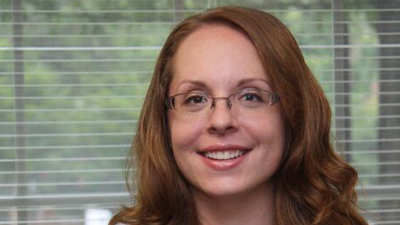Q&A with Page Center research fellow Diana Sisson
April 29, 2019

By Leah Tobia, Page Center intern
It is difficult to identify authenticity in a time when fake news and mistrust make headlines. Diana Sisson, an assistant professor of public relations at Auburn University, is bridging the gap between how practitioners and researchers define authenticity.
In 2017, Sisson’s proposal on digital media research was selected by the Page Center. She is now one of two scholars the Center selected last August for its new research fellows program. As part of the fellowship, she will conduct a research project that will test definitions of authenticity over the next two years.
At Auburn, Sisson teaches public relations courses. She also worked for major healthcare organizations for several years where she did digital public relations, specifically social media content and web content management.
Through the use of quantitative and qualitative methods, Sisson will gain an understanding about the gap that currently exists when defining authenticity.
How do you define authenticity?
Often times when people are asked to talk about authenticity, it’s kind of like asking someone what their definition of ‘good’ is because everyone has a different definition. I find that fascinating. In my opinion, to be authentic requires a consistency and congruency between what you say and what you do. Over the next two years, my research will focus on bridging the gap between how practitioners and researchers define authenticity.
What have you seen so far throughout the time you have conducted this research? What do you hope to see?
I am still in the early stages of research. Right now, I am looking at what public relations scholars are saying in terms of research. What I see from academic literature is that a lot of people are evaluating authenticity from either a quantitative or qualitative approach, but there isn’t a lot of mixed method research. When authenticity is examined, researchers apply it to public relations topics including social media or non-profit organizations. In reviewing the literature, it seems like there is a need for further refinement and uniformity and how we measure it, and there is not a lot of consistency.
How do you plan to bridge the gap?
I have looked at scholarly components and next, I am going to talk to practitioners and conduct interviews. I want to see how they define as authenticity. When I pull it all together, I’m planning to test a very rough definition of authenticity. By talking to both scholars and academics, I am bridging that gap. Part of the call for a research fellow is to go through and write papers for practice and write research articles from the findings. So, that is how I plan to bridge that gap.
What are your thoughts on the Page Center? Why do you think the mission is important?
The Page Center is an excellent resource and advocate for integrity in public communication. Their mission fuels the advancement of ethical practices and highlights the importance of responsibility in public communication. Given today’s media environment (i.e. traditional media and digital media), I think it’s wonderful to have an organization like the Page Center that champions ethical communication practices through their support of innovative research and creation of educational resources such as their public relations ethics training modules.
Do you have any mentors or role models that have guided you throughout your career?
There are people in my career who have been very influential. Some of them are in public relations and some of them aren’t. I have mentors who have encouraged me to focus on authenticity (Shannon Bowen and Denise Bortree); I have a mentor through AEJMC’s Public Relations Division who I talk to on a regular basis about research, academia and public relations at large (Heidi Hatfield Edwards). I could go with this list because I’ve learned something from every person I’ve worked and interacted with over the years. But, the long and the short of it is that I’m thankful for all the mentorship I’ve received and continue to receive.

